I Hope This Helps 👍🏽 (Week of 5/5)
Tactical urbanism IRL, the case against zoning, #BuildTheTunnel, and the power of asking the question "why" in this edition of I Hope This Helps👍🏽!
Welcome to I Hope This Helps, a weekly roundup of articles I’ve encountered that furthered my thinking about cities and life. From sustainable transportation to housing, to design, and the social forces shaping our daily lives, I take a broad lens in this review. Whether you're a planner, advocate, or just curious about the world around you, I hope you’ll find something here that resonates.
1️⃣ Tactical Urbanism in Lincoln Square
A 700 ft, one-way stretch of Lincoln Ave in Lincoln square has provided a venue for tactical urbanism in Chicago.
Tactical Urbanism. (n) - Tactical Urbanism is all about action. Also known as DIY Urbanism, Planning-by-Doing, Urban Acupuncture, or Urban Prototyping, this approach refers to a city, organizational, and/or citizen-led approach to neighborhood building using short-term, low-cost, and scalable interventions to catalyze long-term change.
Emergency construction required this stretch of road to be closed to vehicular traffic. Given the existing human-scale design of the stretch of road, local residents took this as opportunity to imagine what the space could be if people, not cars were centered.
In a city where bureaucratic inertia means things rarely get done, and when they do, $500 is “invested” in a $50 task, these residents decided to opt out of the existing process altogether. Armed with power tools and a vision, they threw together some quick build benches, bought some chalk, and activated the space.
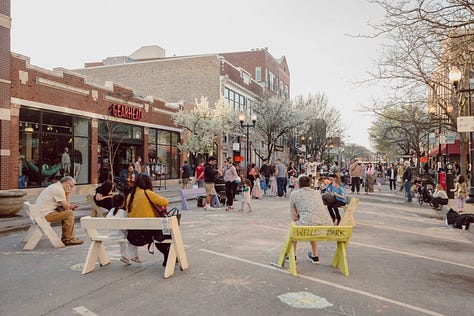
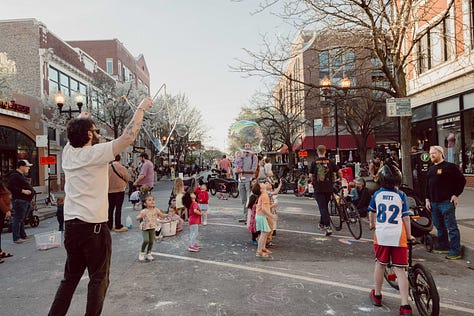
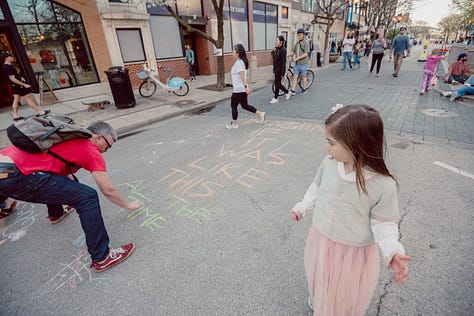
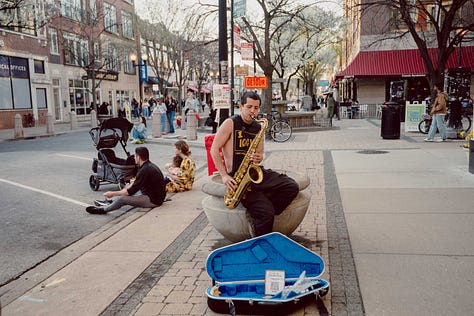
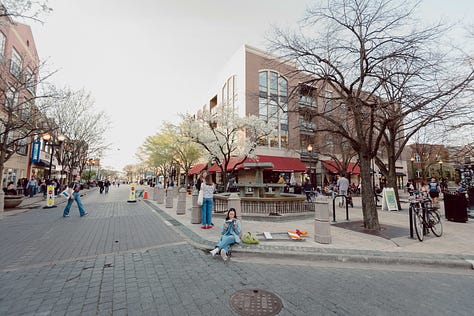
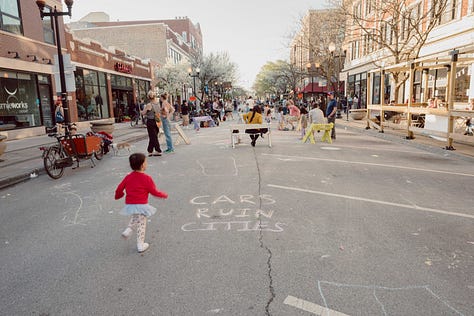
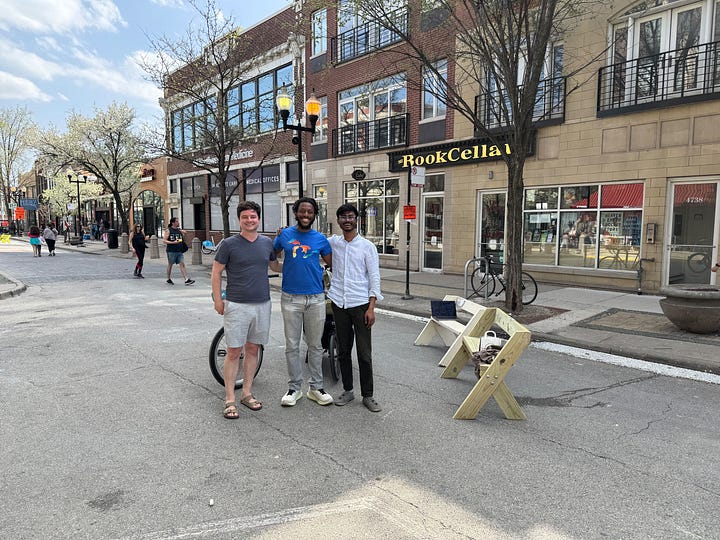

To date, the only vocal opponents are a few current business owners concerned about how restricted vehicular access will impact customers’ ability to patronize their business. For what it’s worth, research suggests that this concern is likely overblown.
Notable visitors of the freshly activated space include State Senator Mike Simmons, the chief sponsor of the People Over Parking Act which eliminates parking minimums statewide within one-half mile of a rail station or high frequency bus stop.
Check out the following coverage of the closure and the life that has popped up in its wake
Street closures prompt reimagining of the Heart of Lincoln Square from NBC Chicago
Eyes on the street: Walk/bike/transit advocates have turned car-free Lincoln Avenue in Lincoln Square into a vibrant public space from Streetsblog Chicago
Heart Of Lincoln Square Goes Car-Free For One Week from Block Club Chicago
If you visit the newly activated Lincoln Ave, fill out this survey to let the tactical urbanists know how your experience was!
2️⃣All Zoning is Exclusionary from the City of Yes
For a while, I’ve been wanting to write an article on zoning. This City of Yes saved me the trouble with this absolute masterpiece. Here are some of my favorite quotes from the article:
Undoubtedly, municipalities have an obligation to protect the rights and well-being of their citizens, but our current zoning regimes fail at the task. Instead, they are systems of exclusion that enforce stasis and scarcity, while rarely protecting people from real harms. We have building codes, environmental laws, and nuisance standards that can—and in many cases already do—address these issues with more precision, flexibility, and certainty. Ultimately, the choice isn’t between zoning and chaos—it’s between exclusion and abundance, between arbitrary preferences and objective law. Cities don’t need zoning to maintain order. They need good governance—rules that protect people, not preferences.
Defenders often argue that zoning provides certainty. But if zoning were predictable, developers wouldn’t need armies of lawyers to interpret it. When the law doesn’t clearly spell out what a property owner can and cannot do, we don’t have the rule of law—we have lawlessness and subjectivity. This isn’t city planning. It’s arbitrary micromanagement.
Zoning’s power lies in its capacity to be boring and esoteric. This article cuts through this in a way that’s concise, comprehensible and justifiably critical. If you don’t read anything in this week’s edition of “I hope this Helps”, please read this article
3️⃣#BuildTheTunnel
Star Line Chicago has been a longtime transit advocate for suburban Chicagoland. In addition to organizing regular, transit-oriented bar crawls, their signature plan, 2034sight, details a 10-year plan for regional rail in Chicagoland. From the Star Line Chicago website:
The 2034sight Plan is an ambitious — and achievable — ten-year framework to lay the groundwork to modernize Chicagoland’s existing local passenger rail system to create an efficient, effective public transit network that expands regional mobility, enhances regional equity, and puts Chicagoland on a more sustainable path to achieve our environmental goals in a cost-effective manner. The 2034sight Plan achieves these goals with five targeted projects that would allow our region to maximally leverage our existing rail network to create CrossTowners, a new six-line regional rail network that will serve as the nexus point of a modern, fully-integrated transit network.
Integral to this plan is the construction of a new tunnel below Columbus Drive and Ohio Street that would allow regional trains to be through routed through downtown, instead of terminating at one of four downtown commuter rail stations. Check out this Youtube video from Car Free Keith detailing the plan, as well as this write up from the good folks at the A City that Works Substack.
4️⃣The Subversiveness of “Why” from Polymathic Being
It’s commonly said that the definition of insanity is doing the same thing over and over again and expecting different results1. Without ever stopping to ask the question “why”, you risk falling into this trap of insanity.
“Why” is one of my favorite questions. In this rapidly evolving world we all share space in, it’s very easy to fall into a cadence of absently jumping from crisis to crisis, while doing little to ensure the crisis wont recur once you’ve moved on. This applies to work, life and everything in between. The powerful question “why” affords you the opportunity to pause and take stock of the moment, and potentially change course if the current approach is not actually achieving the outcomes you want. This piece from Polymathic Being discusses the power of asking why, and why it can be seen as a threat to some leaders, particularly those that have made a habit of not asking (or meaningfully answering) why.
Thanks for reading! I’m doing research for an article about the urban planning space generally and could use your help. If you work in urban planning or an urban planning adjacent field, or you live in a city and care about how it functions, please take a minute and fill out this 5 minute survey and pass it around your networks. Thanks in advance!
» Survey Link «
If you enjoyed this post, check out the rest of my articles here!
I know this isn’t actually an Einstein quote, but that doesn’t change its validity






